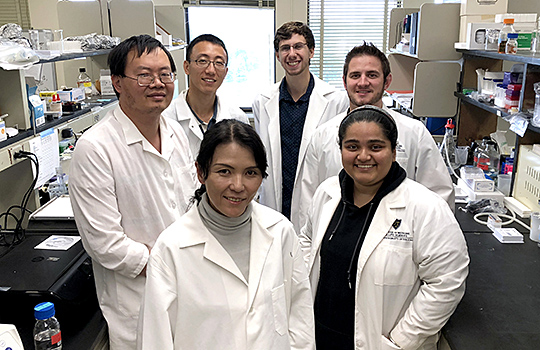Without treatment, more than 40 percent of precancerous breast lesions could develop into invasive breast cancer.
But what if scientists could more accurately predict which lesions are likely to become cancerous, or better yet, provide women a way to prevent the lesions from forming in the first place?

Dr. Saori Furuta, front left, received a $792,000 grant from the American Cancer Society to study precancerous breast lesions with her team, from left, Dr. Xunzhen Zheng, postdoctoral researcher;
Dr. Gang Ren, graduate student in the Department of Mathematics and Statistics; Matthew Bommarito, research technician; and Joshua Letson and Yashna Walia, graduate research assistants.
Furuta has spent years exploring the role nitric oxide plays in the development of precancerous lesions. Nitric oxide is a signaling molecule produced throughout the body, and abnormal levels of it in mammary cells has been implicated in the formation of early-stage cancer.
Now Furuta is investigating how nitric oxide, in its proper concentration, can suppress tumors from forming, and whether its abnormal concentrations might be able to be used as a biomarker that identifies women with or at risk of developing early-stage cancer.
“We have made great progress in diagnosing and treating breast cancer, but it remains a lethal disease. One in eight women will get breast cancer during her lifetime, making it the second leading cause of cancer death among women,” Furuta said. “The hope is that this study will not only advance our understanding of the cause of breast cancer, but also contribute to the development of new approaches to prevention and early detection methods. Taken together, those methods could save lives.”
Furuta’s research is being funded by a multi-year $795,000 research grant from the American Cancer Society. The study was one of 74 funded earlier this year by the American Cancer Society across the United States.
“Dr. Furuta’s goal in finding the causes of precancerous lesions could further the progress in breast cancer prevention and treatment, helping to save lives,” said Sarah Wells, executive director of the Northern Ohio American Cancer Society. “This new research grant at The University of Toledo is just one example of how the American Cancer Society is leading the fight against cancer with the support of our local community and partners.”
Furuta has already examined the link between abnormal — too high or too low — levels of nitric oxide and mammary tumor formation. This research will take that prior work a step further by investigating the mechanisms by which a normal level serves to protect breast cells.
To do that, Furuta’s lab will use a mouse model in which tumor-promoting genes have been altered so they would not be affected by nitric oxide. Researchers will be able to test whether those specific genes produce mammary tumors, similar to how they do when nitric oxide levels are abnormal.
Lab tests also will be conducted on normal human breast tissue, as well as tissue from different stages of cancer to determine how the level of nitric oxide changes as cancer develops and progresses.
“Ultimately, we want to test whether proteins secreted in the blood and urine are also modified by nitric oxide and whether such analyses could be utilized in biological tests to diagnose breast cancer,” Furuta said. “Since there is no such diagnostic test available for many types of cancers, this would be a breakthrough.”
The grant from the American Cancer Society was preceded by an anonymous $50,000 gift from one of the members of The University of Toledo Medical Research Society to begin preliminary research.
“Utilizing the donation, we finished some of the critical experiments and re-sent our proposal,” Furuta said. “Without the generous support, this would have been impossible.”